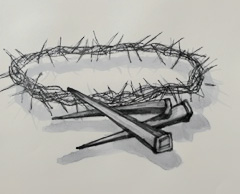“Then the Lord said, “I have seen the affliction of my people who are in Egypt, and have heard their cry because of their taskmasters; I know their sufferings, and I have come down to deliver them out of the hand of the Egyptians, and to bring them up out of that land to a good and broad land, a land flowing with milk and honey…”
Exodus 3:7-8 (RSV)
There have been two great exoduses that happened, and both exoduses began with God seeing and hearing the cries of His people who were in misery. God is Holy and omnipresent, yet in His compassion and love for us, He describes Himself as “coming down” to His people. He is tuned in to our every cry, and He sees everything that causes us misery. We may feel like He is far off and doesn’t hear us or see what we are suffering, and the Israelites felt the same way. They almost gave up hope that God was watching or hearing them in all their suffering in Egypt.
The word used in this scripture is misery, and other versions use the term oppression or affliction. God told Moses from the burning bush, He sees their misery, affliction and oppression and has come down to deliver them. This scripture should remind us of how God came down to us through the incarnation of Jesus. His coming down to us verifies the truth that God also sees us and hears us today when we cry out to Him.
In the first Passover that freed the Israelite slaves, it was the blood of an unblemished lamb, placed on every doorpost, which sign and signal to the death angel, to not strike that household, which trusted in the blood. God led them out of bondage and parted the sea for the people He loved all along.
Easter is the second, and final exodus, a fulfillment of the first one. God came down again to deliver us, only this time He provided the unblemished lamb Himself, giving us His only son, Jesus. He heard the cries and saw the misery of His people living under Roman oppression, and today He sees whatever sorrow or misery we go through, and He still comes down to us today.
After He divided the sea in the first exodus He provided bread from heaven to sustain them in the wilderness. In the second exodus, the thick temple curtain was supernaturally split open the moment Jesus died, which represents giving us an access to God through His sacrifice.
We are all journeying through a wilderness now, as the Israelites did, and God still sustains us. Since Jesus called Himself the bread of heaven, He is with us day by day, sustaining us through whatever wilderness experience we are going through. In His love and compassion, He hears and sees everything we suffer. Our destination and hope is to reach His promised land of heaven, instead of a geographical one as in the first exodus. The route to get there involves traveling through a wilderness just as in the first exodus.
His resurrection broke the power of sin and death, which has no power over us anymore. Instead of leading us with a pillar of cloud or fire, His Spirit dwells within us and leads us from within, as we journey onward. Jesus told us to ask anything in His name, because there is no other name given among mankind, by which we are saved. (Acts 4:12)
So after Easter, we continue on our journey to the promised land, with the shepherd of our souls leading us. We are the children of the second exodus. God is love, and He loves us so much that He “came down” to us through Jesus. We can trust His promise that He will never leave us or forsake us.
Lord, thank you for our exodus as we celebrate this Easter season of deliverance. As you lead us through the wilderness all the way to our promised land, please keep sustaining us one day at a time, on our journey with Jesus, who is our daily bread of heaven. Amen
